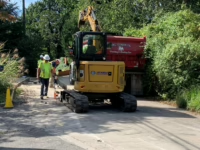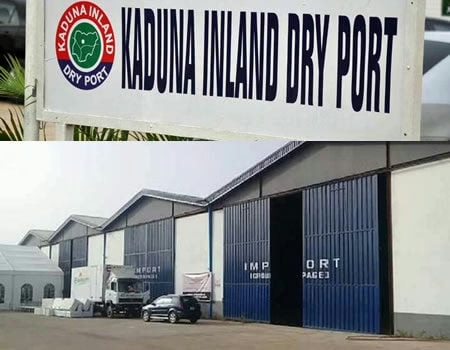The Kaduna Inland Dry Port in Kaduna State is currently functioning well below its full potential due to the halt of rail services from Lagos seaports. This disruption stems from ongoing security threats and recent floods that have severely damaged sections of the railway line along the corridor.
Commissioned in 2018 by the late President Muhammadu Buhari, the Kaduna Dry Port was envisioned as a strategic cargo handling and customs clearance center for Northern Nigeria. Its purpose was to alleviate congestion at Lagos ports and streamline trade logistics for businesses located inland.
Nevertheless, sources reveal that for several years, rail transport of goods from Apapa Port in Lagos to Kaduna has been suspended. This is primarily due to repeated banditry incidents in Niger State and floodwaters that destroyed parts of the narrow-gauge railway at Mokwa.
Consequently, all freight destined for the dry port is now transported exclusively by road. Industry experts criticize this shift as costly and counterproductive to the original goal of developing inland dry ports nationwide.
At the 2025 Nigeria Transport Sector Summit hosted by the Transport Correspondents Association of Nigeria (TCAN) in Lagos, Engr. Kayode Opeifa, Managing Director of the Nigerian Railway Corporation (NRC), confirmed that security concerns have compelled the suspension of rail cargo services to Kaduna.
“Insecurity in Niger State has made it impossible for the NRC to operate cargo trains to Kaduna Dry Port,” Opeifa stated. “Nonetheless, the governors of Niger and Kaduna states are actively collaborating to resolve these issues,” he added.
An insider at Kaduna Dry Port, speaking anonymously, highlighted that beyond security challenges, recent flooding in Niger State has also washed away a segment of the railway track, effectively severing the port’s connection to the national rail network.
“The transportation of goods from Lagos to Kaduna is hindered not only by insecurity but also by flood damage to the rail infrastructure,” the source noted. “We anticipate that the NRC will undertake repairs so that once the security situation improves, cargo can resume rail transit to the inland port.”
With rail services suspended, the dry port depends entirely on trucking for cargo movement-a method logistics professionals describe as expensive, inefficient, and unsustainable in the long term.
There is growing concern among stakeholders that prolonged inactivity of rail operations may deter importers from utilizing the facility, thereby weakening the federal government’s vision of inland dry ports as catalysts for regional commerce and economic growth.
Despite these setbacks, the NRC and the relevant state authorities have pledged to restore rail connectivity as soon as security conditions improve and the damaged tracks are rehabilitated.






















